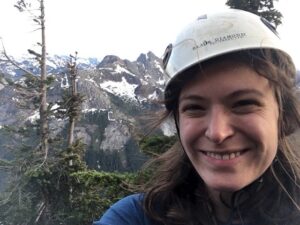
It’s not every day that a rural doctor freshly out of residency is tasked with managing a critically injured patient on their own.
But for new physician, Dr. Nicki Gabers, it’s definitely something she’s starting to get accustomed to.
That’s why she’s grateful for the help she can get from Real-Time Virtual Support—a physician friend at the click of the button when she needs it.
“I think if I hadn’t had RUDi to call and go over everything, that would have been a very traumatizing case for me to have right out of residency. I don’t think I’d be feeling as comfortable and excited to go back up North and work back up North.”
Dr. Nicki Gabers
Dr. Gabers, who lives in the Kootenays, has been locuming in small communities across the province.
Despite being a fully-fledged doctor for less than a year, Dr. Gabers isn’t a stranger to difficult medical procedures. She has already been involved with providing six chest tubes for airway management.
But at a locum in a remote community in Northwest British Columbia (BC), she took a call that would lead to one of the most intense and stressful situations any doctor can experience. A call came through that a young teenager was critically injured in a head-on collision and she was the nearest—and only—physician in the area.
“I hadn’t had to do an entire trauma before where I didn’t have any other doctor in the room, let alone anything like this,” said Dr. Gabers. “I’ve done some rural medicine, but you can usually call some sort of friend in, but the closest friend that I had, that I could physically have in the room, was at least an hour away.”
At that moment, Dr. Gabers knew that, even though she couldn’t have a friend by her side, the next best thing was to have a friend on the other end of the smartphone.
“I just really wanted someone to be there looking over my shoulder, giving me advice as I go. And RUDi was definitely that for me,” said Dr. Gabers.
RUDi doctors are virtual Emergency physicians who connect with rural doctors, nurses, midwives and other providers over Zoom. They are part of the RTVS peer support program, which is also staffed by virtual physicians who can support maternity and newborn (MaBAL) and pediatric (CHARLiE) cases.
Dr. Gabers called RUDi from the Zoom app on a smartphone and on the other end of the call was Dr. Ryan Hoskins.
“I think this case was an emblematic example of exactly how RTVS and RUDi can work because it was a situation where it was as acute as it basically gets,” said Dr. Hoskins. “Dr. Gabers was simply looking for a second opinion in the same way that you would if you were in an Emergency Room in the city and you had such a serious case going on. You’d want a colleague in the room to help you out. And so we got that call and, with RUDi, it allows you to be there virtually,” he said.
“The doc, she had such great competency and confidence. All I was doing was providing a second opinion, and in the way that RTVS is supposed to be a friend.”
Dr. Gabers said Dr. Hoskins’s help had made a stressful and difficult situation more manageable. “I think if I hadn’t had RUDi to call and go over everything, that would have been a very traumatizing case for me to have right out of residency. I don’t think I’d be feeling as comfortable and excited to go back up North and work back up North.”
She added: “I couldn’t imagine how much worse it would have been without having somebody else there reviewing it with you and saying, like, no, this is the right thing.”
Dr. Hoskins said he had experienced stressful situations out of residency, as well, and could relate to how Dr. Gabers was feeling.
He said: “That was part of my motivation for getting involved in RUDi, I think, is knowing that I could offer something that might be a bit different from what happened for me.”
This trauma case was a prime example of how RTVS peer supports can make a difference, but both Dr. Hoskins and Dr. Gabers were keen to stress the importance of normalizing calls for support even when the case is more routine.
Dr. Hoskins said: “Anytime is a good time to call RUDi because it’s just a buddy system, even for things that are more stable, but maybe you’re not sure what’s going on. It’s still a totally appropriate call and we’re very happy to have those calls.
“It’s just an easy thing to do and a really healthy improvement with how rural care can be provided.”
Visit the RTVS page to learn more about RTVS. If you are a rural provider, more information on how to get started is here.